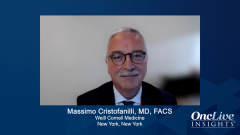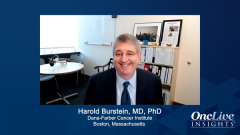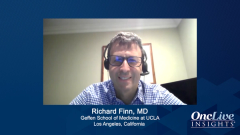
Importance of Molecular Testing in HR+/HER2- Metastatic Breast Cancer
A brief review of molecular testing’s role in HR+/HER2- metastatic breast cancer and how certain driver mutations can impact care.
Episodes in this series

Transcript:
Richard Finn, MD: Molecular testing has become very important in medical oncology and cancer medicine. We have drugs now that are approved and target specific alterations in many cancers, including ER-positive HER2-negative breast cancer. When we look at the CDK4/6 data sets, these studies broadly included patients just based on immunochemistry assays, specifically ER and PR receptor status, and then HER2 status based on molecular studies, generally a FISH [fluorescence in situ hybridization]-based assay. However, we do know that there is a certain incidence of genetic alterations that occur that do not only have prognostic but predictive significance as well.
For example, PI3 kinase mutations occur in ER-positive HER2-negative breast cancer. These have been associated with benefit to the PI3 kinase inhibitor, alpelisib, in combination with fulvestrant. Generally, that data has been generated in the second-line setting after prior AI [aromatase inhibitor]. We now have some data, even in patients who had prior CDK inhibitors, there appears to be a benefit to those drugs. In addition, BRCA mutations occur in ER-positive HER2-negative breast cancer, though to a lower frequency than seen in other subtypes of the disease. We know that the PARP inhibitors have a very important role in managing this subgroup of patients, especially germline mutations and also estrin receptor mutations. ESR1 mutations occur in patients with ER+ breast cancer, mostly in patients who have had prior aromatase inhibitors. When we have a patient, who is presenting with newly diagnosed ER- positive HER2-negative breast cancer, it is not unreasonable to send off molecular profiling for these alterations, so you know how to approach these patients in the future. One issue that arises is that we do not use these markers in selection of frontline therapy. I think still most of us view the data with CDK4/6 inhibitors and endocrine therapy as being the most significant in this population based on PFS tolerability and now overall survival data.
One of the key questions is what do we do when patients progress on a CDK4/6 inhibitor? Knowing the mutation status might be helpful. Studies that have been done on patients who are progressing on CDK4/6 inhibitors have shown that the development of mutations that are associated or hypotheses that hypothesized as being important for CDK4/6 resistance such as mutations in the cyclin-D-Rb pathway or cyclin-E pathway. These do not occur very frequently. More frequently, what we see are acquired mutations in the endocrine pathway and specifically ESR1 mutations. I think patients with ER-positive HER2-negative breast cancer do need molecular profiling. It does necessarily affect choice in the frontline setting. However, having that data early on can help you develop your treatment plan moving forward as patients receive their treatment. It is not unreasonable to repeat profiling at disease progression to see what acquired alterations may have occurred that might influence your choice of treatment moving forward. We will see data at the ASCO [American Society of Clinical Oncology] 2022 meeting of the use of CDK inhibitors beyond progression. It’ll be very interesting to see what that data looks like, especially in regard to any new mutation data that comes out of that study.
Transcript edited for clarity.







































